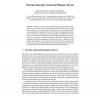Free Online Productivity Tools
i2Speak
i2Symbol
i2OCR
iTex2Img
iWeb2Print
iWeb2Shot
i2Type
iPdf2Split
iPdf2Merge
i2Bopomofo
i2Arabic
i2Style
i2Image
i2PDF
iLatex2Rtf
Sci2ools
DAGSTUHL
2001
2001
Decision-Theoretic Control of Planetary Rovers
Planetary rovers are small unmanned vehicles equipped with cameras and a variety of sensors used for scientific experiments. They must operate under tight constraints over such resources as operation time, power, storage capacity, and communication bandwidth. Moreover, the limited computational resources of the rover limit the complexity of on-line planning and scheduling. We describe two decision-theoretic approaches to maximize the productivity of planetary rovers: one based on adaptive planning and the other on hierarchical reinforcement learning. Both approaches map the problem into a Markov decision problem and attempt to solve a large part of the problem off-line, exploiting the structure of the plan and independence between plan components. We examine the advantages and limitations of these techniques and their scalability. 1 Towards Autonomous Planetary Rovers The power of a mobile platform to perform science and explore the surface of distant planetary surfaces has long attrac...
Related Content
| Added | 31 Oct 2010 |
| Updated | 31 Oct 2010 |
| Type | Conference |
| Year | 2001 |
| Where | DAGSTUHL |
| Authors | Shlomo Zilberstein, Richard Washington, Daniel S. Bernstein, Abdel-Illah Mouaddib |
Comments (0)

